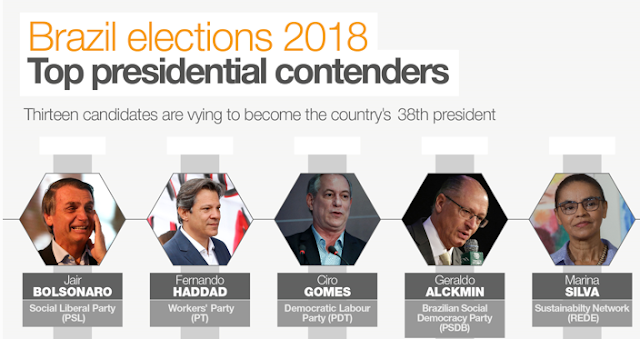Brazil – An Overview of past political leaders
In recent years Brazil has seen political turmoil
beginning from a very popular leader- Lula da Silva to Michel Temer. These were
established leaders who faced huge charges. For example, due to the anti-graft
developments, it removed established leaders from the fray, including the most
popular leader Luiz Inácio Lula da Silva, the former President from the
left-wing Workers’ Party (PT) now serving a 12-year jail sentence. His
bid to run for a third term was quashed by the electoral court, following the
dismissal of an appeal against his 2017 conviction.
Under his successor Dilma Rousseff, Brazil
plunged into its worst recession in a century. She was impeached, but
more on technical grounds linked to fiscal mismanagement than any egregious
violations.
 |
| Luiz Inácio Lula da Silva serving 12 year Jail term No |
The outgoing President, Michel Temer, also came under the prosecution’s scanner
but he survived. The overall atmosphere in the run-up to the elections has thus
got murkier.
Therefore due to the result Brazil has received
under these established leaders, the population now wants anti-establishment
leaders. An anti-establishment view or belief is one which stands
in opposition to the conventional social, political, and economic principles of
a society.
The Political Campaign
The campaign for Sunday’s elections in Brazil
is beset by an
anti-establishment mood, as in several democracies. Legislators at the
state and national levels are being elected, but it is the contest for the
President’s post that has really polarized the campaign.
The Reason- Operation Car Wash
The personalized nature of the contest owes to the lingering shadow of Operation Car Wash, a buzzword for the anti-corruption campaign that underpins the confrontation between the legislature and the judiciary. A major anti-corruption known as Lava Jato, or Car Wash, and other interlocking investigations have seen more than 150 Brazilian business leaders, corporations and politicians - including Lula - prosecuted for corruption since 2014.
The personalized nature of the contest owes to the lingering shadow of Operation Car Wash, a buzzword for the anti-corruption campaign that underpins the confrontation between the legislature and the judiciary. A major anti-corruption known as Lava Jato, or Car Wash, and other interlocking investigations have seen more than 150 Brazilian business leaders, corporations and politicians - including Lula - prosecuted for corruption since 2014.
At the centre of the investigations into the
multi-billion dollar distribution of patronage to political and bureaucratic
bigwigs is Petrobras, the state-owned oil firm.
Presidential Candidates and Social Images.
There are going to be several opinions, and
there is a sharp competition between the far right candidate Jair
Bolsonaro and far left candidate
PT’s Fernado. Mr. Bolsonaro is far
right candidate, and ex army captain, and he is popular as anti-establishment
leader. Mr. Bolsonaro was stabbed in a
rally, and he has been hospitalized. The campaigns are done from hospital bed
itself. While supporters of jailed
leader Luiz Inácio Lula da Silva have turned towards Fernado Hadda.
So, there is a sharp clash between far right
and far left candidates, and this polarizes the society of Brazil. The
firebrand politician’s homophobic and misogynistic views triggered protests
over the weekend by thousands of women.
Mr.
Haddad’s prospects may have improved had the PT reconciled itself to the
overturning of Mr. Lula’s appeal in January. The party’s best hope now is
that the economist will convert the former President’s popularity into votes
for himself.
There
is concern among investors that the election of a populist may impede long
overdue reforms to break the dominance of sectional interests in Brazil’s
economic policies. Such intervention is seen as crucial to restore investor
confidence, stimulate infrastructure growth and reverse Brazil’s recession.












